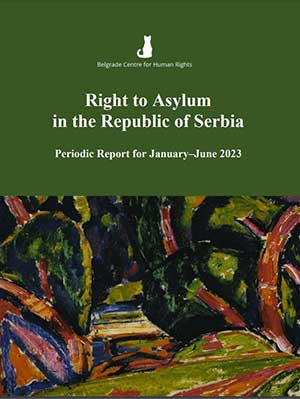The Belgrade Center for Human Rights team has compiled a report on the right to asylum in the Republic of Serbia, covering the period from January to end June 2023 which analyses the treatment of the asylum seekers and refugees, based on information the BCHR team obtained during their legal representation in the asylum procedure and provision of support in their integration, and during its field work. The Report also comprises data the BCHR collected through regular cooperation and communication with the state authorities and UNHCR.
The Commissariat for Refugees and Migration reported that 35,714 migrants and asylum seekers had been registered in the RS Asylum Centres and Reception-Transit Centres in the first six months of 2023. Due to the ongoing international armed conflict between Russia and Ukraine, EU Member States extended the duration of temporary protection granted refugees from Ukraine for at least one year. The RS Government followed suit and adopted a Decision Amending the Decision on the Provision of Temporary Protection in the Republic of Serbia to Persons Displaced from Ukraine of 17 March 2022 and extending temporary protection by one year, until 18 March 2024.
The deficiencies of the RS asylum system, which the BCHR has been alerting to for years, persisted in the reporting period. The greatest challenges in practice concerned the foreigners’ access to the asylum procedure, the duration of the asylum procedure and the uncertainties of its outcome. As per the foreigners’ access to their integration-related rights, despite progress in some areas over the past few years, systemic solutions ensuring their long-term protection and effective access to all the rights they are guaranteed are still missing.
The Report is primarily addressed to state authorities charged with ensuring the realisation of the rights of asylum seekers and foreigners granted international protection, as well as other professionals and organisations monitoring the situation in the field of asylum. Its authors endeavoured to point out good practice examples, as well as specific shortcomings in the work of the relevant authorities and offer recommendations on how to address them in order to help the relevant RS authorities establish a more functional asylum system.
The report can be downloaded here.
